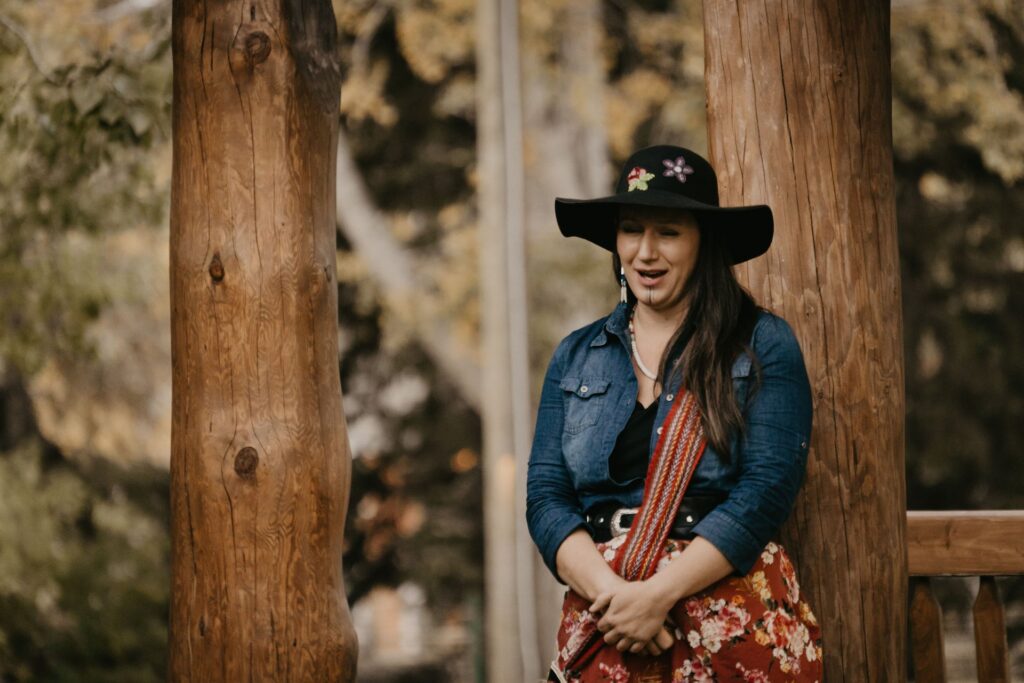
Sharing traditional skills is a ‘doorway to a common understanding’ for entrepreneur
Entrepreneur Profile: Natalie Pepin of Reskilled Life
By Kelsey Olsen. Photos by Noella Steinhauer.
What’s your name and where are you from?
My name is Prayerful Woman, I am known as Natalie Pepin. I am from Winnipeg and I now live in the Tawatinaw Valley, about an hour and forty-five minutes north of Edmonton.
Describe your business in one sentence.
Reskilled Life seeks to connect people with the traditional skills that are a part of our human heritage and have allowed us to survive and thrive up until this point.
What’s the biggest challenge in running your business?
Business owners like myself are always reaching towards having a successful business, but once you have a successful business, it’s really hard to find enough time to do everything. Finding help can also be incredibly challenging. Especially, when you run a small Indigenous business, it’s hard to find the right person to partner with and take some of that load off.
What’s the best moment you’ve had with your business?
I have had so many good moments. Reskilled Life has programming for the general public and we also have programming for Indigenous People who are reconnecting. These programs go under the label of “Meeting my Ancestors.” In some of these programs people are taking very tentative first steps into getting to know their culture as a means of healing for themselves. I have received emails afterwards saying words like, “it was a pivotal moment in my life.” I’ve also seen some of my students who have come through my program become Indigenous interpreters at various other tourist sites in Alberta. That makes me feel really good.
What part of your business are you most proud of?
I’d say the perspective that we are approaching everything from makes me proud. It’s really tricky as an Indigenous person who falls under tourism because we’re not “selling” our culture. That’s not what it’s about, it’s about building relationships with all people and using our culture as a means to build relationships. Oftentimes, we’re navigating difficult conversations while doing it in a way that people feel comfortable with. Having these conversations and having people walk away afterwards feeling really good about it, that makes me really proud.
Why do you run this business?
I started this business years ago. I was a single mom living in Calgary, teaching business at the time but I had always loved traditional skills. I would frequently be doing things like tanning hides, making moccasins, making soap, even butchering animals, which are all things that most people do not usually do themselves. I started inviting people to my house in Calgary through social media to learn about some traditional skills, I called them “Reskilling Events.” It started out as just a random thing but it went really well and the people who showed up were good people who wanted to learn new things. Then, when I moved up north, I decided to try again in the valley where I live. I would go on Facebook groups and make a post saying, “Hey, on this day I’m going to spin some wool and make some soap. If you want to learn how to do these things I live in the blue house at the top of the hill and you can just show up,” and people showed up again. It was really inadvertent; it was just my desire as a single parent wanting to do these things with other people because these skills are meant to be done as a community. It was my desire for community that started this business and that is still why I do it. I get to spend my time doing the things I love with great people.
Who is your inspiration?
There are so many. My grandmother because she has been so important for reconnecting our family with our culture. Blackfoot Elder Narcise Blood also inspires me. He was so instrumental and inspirational to me in seeing the connections between everything. When I talk about traditional skills or relationships with plants, it’s connected to everything else, it’s not in isolation. I learned that from him. He wove that story of why everything is so important together. We call that Wahkohtowin in Michif and it means that everything is related. He really helped inspire me to teach these skills as a doorway for reconciliation and sharing a common understanding.
What’s your hope for the next seven generations?
I would love for my business to not be needed. I would love for this to be completely redundant — that it’s just happening in the community. I would love to see people have connection to knowledge keepers who share these things with them and that we’re all really respecting our relationship with the land. My hope for the next seven generations is that our cultures are so healthy and thriving that it has become or returned to being the background noise of our lives. We just immerse ourselves in it constantly and its natural for it to be there. Hopefully this happens before seven generations.
What’s one thing you wish more people knew about your business, yourself or your community?
For me, I think it’s important for people to know that this isn’t a hat I wear. It’s not something I put on when I go into public. I’ve chosen to live off grid. I’ve chosen to heat my home with a fireplace. I’ve chosen to preserve most of my family’s food. I’ve chosen to tan hides and make moccasins and mukluks out of that. I’ve chosen to sew clothing for my family. I’ve chosen the life that my ancestors knew and I’ve chosen to live it on a regular permanent basis. I’m not living 200 years ago, and I acknowledge that. But at the same time, this culture is not a hat I wear. It is who I am every day and so sometimes when we think about tourism, we think about going to a place where they dress up in costume and pretend as though it’s the past. That’s not what this is. This is living as an Indigenous person in the modern day, using our traditions.
What ITA resource is most valuable to you?
There has been so many programs that I have taken advantage of with ITA and they’ve all been incredibly valuable. I would say what’s been most important for me is the people though. Being able to email and say, “I have an idea and I want to talk about it,” with a group of people who are there to promote the growth and development of my business, that’s been critical for me.
